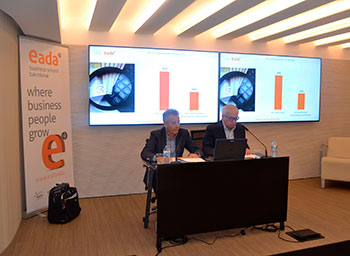Executives not worried by pensions
The EADA study How pensions are viewed by managers and professionals has revealed that Spanish executives and managers only start worrying about their retirement income after turning 60. According to the 350 managers, business owners and professionals who participated in the study, only 35% of those between 51 and 60 years old are concerned about their income levels once they retire. This percentage is even lower for younger generations. However, it quickly rises to 77% for the over 60s when the chances of making adjustments and increasing their saving capacity are seriously reduced.
According to Jordi Costa, professor of the EADA Personnel Administration Department and co-director of the study, “there are a lot of professionals that wait too long to find out about their future economic situation. When they reach 60, it’s too late to react.”
Investment and savings options
In spite of this situation, the majority of professionals also understand that their public pension will not cover all their normal expenses. As a result, 71% have opted for investment or saving plans to supplement their future retirement. 76% of respondents admitted to having a pension plan and 35% have made long-term personal investments in real estate. 26% have investment funds while others have chosen less common alternatives such as fixed-term investment funds (17%), individual saving plans (17%), shares and bonds (14%).
Rafael Sambola, EADA Finance professor and co-author of the study considers that due to the macroeconomic circumstances, supplementing future public income with other ways of saving is highly recommended. He recommends “private pension plans and workplace pension schemes because they are useful saving tools which include a legal cover. However, only 10% of the population currently has one.”
The EADA study also reveals that self-employed professionals (business owners and freelance workers) are more inclined to supplement their public pensions with other sources of income than employed professionals. The data shows that 32% of employed professionals do not supplement their public pension compared to 16% of self-employed professionals.
Private pension plans and public policy
According to the study, up to 46% of those surveyed would be willing to pay higher taxes in order to shore up the pension system. 44% would also like the retirement age to gradually increase to 70 years old so as to reflect the increase in life expectancy.
However, the survey respondents also criticise the State’s little or lack of interest in creating workplace pension schemes. 42% also state that they would pay higher taxation if it were to improve their fiscal conditions.

